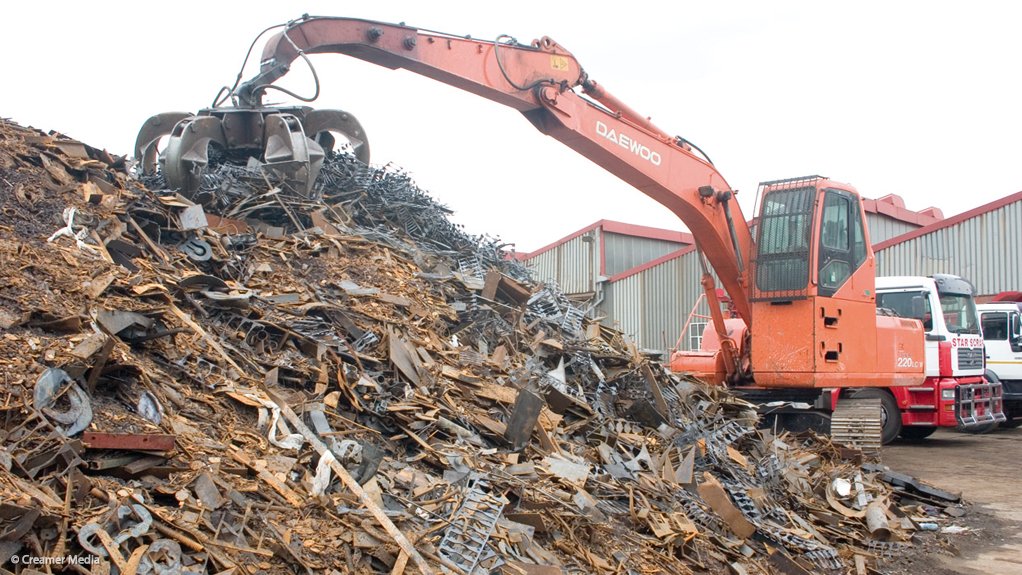Scrap metal export ban to buy time for SA to build systems to tackle illegal activity
The proposed policy to ban the export of waste, scrap and semifinished metal products for a period of six months is necessary to immediately reduce the ability of criminal syndicates to monetise stolen metals, while registration systems are put in place to hamper their ability to mask stolen metals within legitimate metal trade, Trade, Industry and Competition Minister Ebrahim Patel has said.
During a presentation to the Parliamentary Portfolio Committee on Trade and Industry on August 23, he provided an overview of the inputs that were considered in the compilation of the proposed policy and answered committee members' questions about the costs and relevance of the policy.
"The ban is temporary. In this period, the domestic market will provide some market for product. When the [regulatory and registration] system is fully developed, then such scrap that has been legitimately and properly obtained and can be explained can be exported," Patel assured committee members.
The new policy regime is intended to challenge the criminal syndicates' ability to operate, sell and export stolen metal, he emphasised.
The temporary prohibition is intended to assist with the creation of a permitting system to realise a material reduction in theft of metal from the country's infrastructure, as it will eliminate or reduce one of the avenues used for monetising stolen metal.
By reducing demand, South Africa can reduce the incentive to steal metal, he said.
"The intervention will divert significant volumes of scrap into the local market, which will then likely lead to lower scrap metal prices. In the local market, the supply will increase but demand will remain constant, leading to a chilling effect and disincentivise theft.
"The export prohibition will not have a significant negative impact on legitimate local upstream collectors and recyclers, as the volumes of waste and scrap that are currently legally exported can be sold locally."
Additionally, the enhanced regulation of domestic metal trading and enforcement will bolster the country's fight against metal theft because anyone found in possession of waste, scrap or semifinished metal products will be required to present a registration certificate.
This will greatly reduce the ability to buy stolen goods and wash them into the value chain, Patel said.
Theft of scrap metal, particularly copper cables, imposes costs on society far beyond the value of the material taken. For example, the economic damage of copper theft alone has been estimated at more than R46-billion a year. This was the finding of research commissioned by the Department of Trade, Industry and Competition (DTIC) and undertaken by an independent research team from Genesis Analytics.
"This regime is intended and designed to undermine criminal syndicates and networks that threaten South Africa's vital economic infrastructure while, simultaneously, limiting the extent to which the new arrangements impose costs on the metal value chain," he said.
The proposed policy, which was gazetted on August 5 for public comment, follows many other measures to reduce the ability of criminal networks to monetise stolen metal, including export restrictions, the introduction of a price preference system for export, the introduction of an export tax and the use of legal provisions to provide limited policing powers to State-owned enterprise officials, among others, Patel highlighted.
"These measures have been broadly successful in achieving their policy goals. However, the advice we have received from State-owned enterprises, the South African Police Service, research organisations and business organisations in drafting the policy is that these measures are insufficient to disrupt criminal syndicates and additional measures are required.
"We have seen the extraordinary measures put in place by State-owned enterprises to address the security part of the challenge, including the use of drones, private security, more fencing and camera networks, but the conclusion the DTIC came to is that several different measures are required in addition to policing and security," said Patel.
The aim of these combined measures is to attack the nerve centre of criminal syndicates. If syndicates are able to monetise stolen metal, it incentivises theft as an easy way to make money and society pays the disproportional costs, he said.
Some of the measures contemplated will make policing easier, such as the introduction of a permit system for the import of furnaces and other machines. These are capable of transforming metal and disguising its origin, which then enables syndicates to operate openly, aggregate hauls, arrange transport and operate with impunity.
Further, the research commissioned by the DTIC indicated that, if the criminal networks can be disrupted and the costs in these networks increased to ensure they cannot operate properly, then South Africa will be able to combat theft of metal and copper cables, Patel said.
"The focus is on the logistics of the scrap metal market. The policy will require traders to maintain registers of who they buy from and sell to, and the implementation of a permit system for scrap export."
Further, many countries worldwide are struggling with metal theft. According to economic bloc the Organisation for Economic Cooperation and Development, nine countries around the world have completely banned copper scrap exporting, 17 have introduced quotas or licensing requirements and 13 countries have imposed taxes and restrictions on export of copper, as well as ferrous and aluminium scrap metal.
Additionally, the approach South Africa is taking is comparable to that of Kenya. Kenya imposed a full prohibition in 2010 that was formulated into law in 2014. However, this was insufficient to stop metal theft.
This year, Kenya again imposed a full prohibition on scrap metal exporting, which was only relaxed after the government created a new trading regime that included a host of local restrictions and requirements, said Patel.
"The proposed regulatory measures will allow the lawful metal collection, recycling, production, export and import to continue, but within the constraint of a regulated environment aimed at combatting the illegal trade in stolen metal."
Further, the DTIC expected that the regulatory interventions may lead to consolidation among scrap metal traders, with informal traders encouraged to formalise their businesses or be employed by scrap metal collection enterprises.
The consolidation of scrap metal feedstock supply is likely to result in some reduction of domestic supply of scrap metal, but the temporary export prohibition and the extension of the export permit system is expected to divert volumes of scrap metal back to the domestic market and offset some of the impact of domestic consolidation, he noted.
Article Enquiry
Email Article
Save Article
Feedback
To advertise email advertising@creamermedia.co.za or click here
Press Office
Announcements
What's On
Subscribe to improve your user experience...
Option 1 (equivalent of R125 a month):
Receive a weekly copy of Creamer Media's Engineering News & Mining Weekly magazine
(print copy for those in South Africa and e-magazine for those outside of South Africa)
Receive daily email newsletters
Access to full search results
Access archive of magazine back copies
Access to Projects in Progress
Access to ONE Research Report of your choice in PDF format
Option 2 (equivalent of R375 a month):
All benefits from Option 1
PLUS
Access to Creamer Media's Research Channel Africa for ALL Research Reports, in PDF format, on various industrial and mining sectors
including Electricity; Water; Energy Transition; Hydrogen; Roads, Rail and Ports; Coal; Gold; Platinum; Battery Metals; etc.
Already a subscriber?
Forgotten your password?
Receive weekly copy of Creamer Media's Engineering News & Mining Weekly magazine (print copy for those in South Africa and e-magazine for those outside of South Africa)
➕
Recieve daily email newsletters
➕
Access to full search results
➕
Access archive of magazine back copies
➕
Access to Projects in Progress
➕
Access to ONE Research Report of your choice in PDF format
RESEARCH CHANNEL AFRICA
R4500 (equivalent of R375 a month)
SUBSCRIBEAll benefits from Option 1
➕
Access to Creamer Media's Research Channel Africa for ALL Research Reports on various industrial and mining sectors, in PDF format, including on:
Electricity
➕
Water
➕
Energy Transition
➕
Hydrogen
➕
Roads, Rail and Ports
➕
Coal
➕
Gold
➕
Platinum
➕
Battery Metals
➕
etc.
Receive all benefits from Option 1 or Option 2 delivered to numerous people at your company
➕
Multiple User names and Passwords for simultaneous log-ins
➕
Intranet integration access to all in your organisation




















